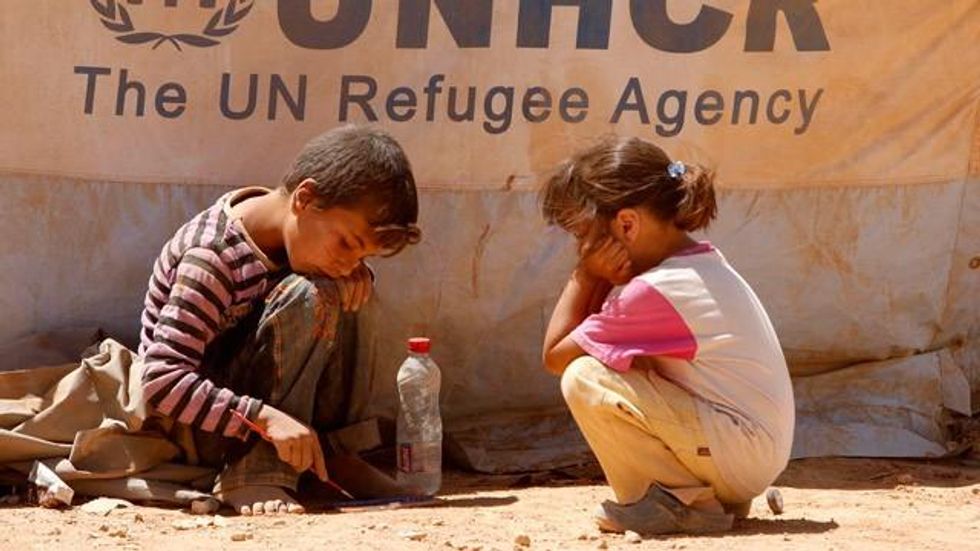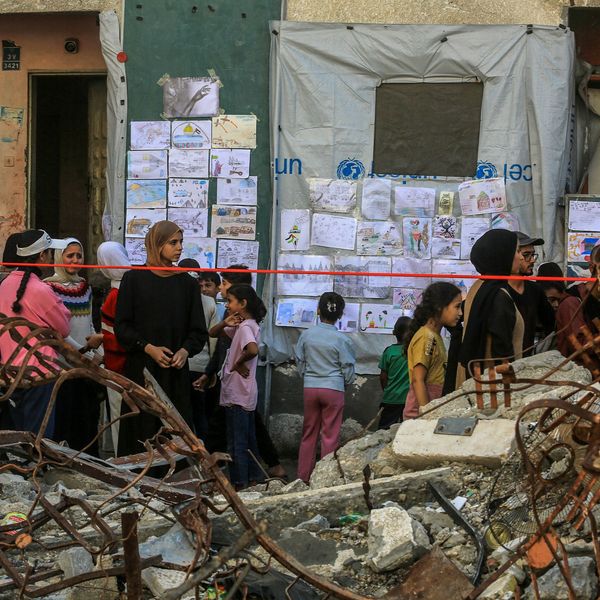Syrian Children Pay the Heaviest Price in War
The numbers of Syrian children affected by the brutal war ravaging their country are truly disheartening. According to UN agencies, one million children, three-quarters of them under age 11, have had to flee their country since the conflict began in 2011. "This one millionth child refugee is not just another number.

The children's dramatic situation doesn't end there, however. In addition to the one million who have been forced to flee their country, two million others are displaced within their own country, making of this one of the most serious humanitarian emergencies today.
Children's nightmarish situation is just a reflection of the wider conflict in their country, which so far has cost the lives of 100,000 people since protests broke out against Syria's President Bashar al-Assad in March 2011. Since then, Syrians of all religious beliefs have been fleeing to Lebanon, Jordan, Turkey, Iraq, Egypt and, increasingly, to North Africa and Europe. As a result, they have overburdened those countries health and social services and, as stated by Antonio Guterres, the UN High Commissioner for Refugees, "The youth of Syria are losing their homes, their family members and their futures."
Continuing the education of this mobile population of children is proving an almost insurmountable task. Few among them have been able to study or receive psychological counseling. Many fear these children have become part of a "lost generation" of children, who will be unable to contribute with their knowledge to their country's development.
Educational problems are frequent not only among those children remaining in Syria, but also among those now living in other countries. A study in Jordan by CARE, one of the leading humanitarian organizations, found that more than 60 percent of school-age Syrian children are not attending any classes, despite the availability of free schooling, which may reflect problems of integration into a new country and circumstances. What makes this situation particularly serious is that the longer children stay out of school, the more difficult it will be for them to eventually return.
In Syria, in the meantime, in areas of more intensive fighting, one in five schools has been destroyed, damaged or is being used as shelter for displaced families. Now in Aleppo, only six percent of children are attending school. Classes that still function are overcrowded with as much as 100 children each, according to a UNICEF report. Many children are suffering the psychological consequences of seeing their family members and friends killed or injured, and become terrified at the sounds and scenes of the conflict.
Drinking water is a hard commodity now in Syria. In the most deprived areas, access to water has fallen by two-thirds, resulting in increased skin and respiratory infections. Four million people inside the country have access to safe water. However, basic infrastructure and public services have been systematically destroyed over the last 24 months, warns UNICEF.
Many children in Syria have been victims of human rights violations including arbitrary detention, torture, and killing, and many have been recruited and made to fight by one of the armies in conflict. In addition, many children are maimed as a result of stepping into explosive remnants of war. Thousands of children have found refuge in overcrowded collective shelters lacking the most basic services. Vaccination against common diseases has been severely disrupted. For most parents, the costs associated with schooling such as transportation, supplies and school lunches have prove to be an insurmountable barrier.
Given the tremendous negative effect of the conflict on Syrian children, it is obvious that we, the national and international community, have failed to protect them, to spare them the consequences of a barbaric conflict. As Anthony Lake stated, "We must all share the shame."
An Urgent Message From Our Co-Founder
Dear Common Dreams reader, The U.S. is on a fast track to authoritarianism like nothing I've ever seen. Meanwhile, corporate news outlets are utterly capitulating to Trump, twisting their coverage to avoid drawing his ire while lining up to stuff cash in his pockets. That's why I believe that Common Dreams is doing the best and most consequential reporting that we've ever done. Our small but mighty team is a progressive reporting powerhouse, covering the news every day that the corporate media never will. Our mission has always been simple: To inform. To inspire. And to ignite change for the common good. Now here's the key piece that I want all our readers to understand: None of this would be possible without your financial support. That's not just some fundraising cliche. It's the absolute and literal truth. We don't accept corporate advertising and never will. We don't have a paywall because we don't think people should be blocked from critical news based on their ability to pay. Everything we do is funded by the donations of readers like you. Will you donate now to help power the nonprofit, independent reporting of Common Dreams? Thank you for being a vital member of our community. Together, we can keep independent journalism alive when it’s needed most. - Craig Brown, Co-founder |

The children's dramatic situation doesn't end there, however. In addition to the one million who have been forced to flee their country, two million others are displaced within their own country, making of this one of the most serious humanitarian emergencies today.
Children's nightmarish situation is just a reflection of the wider conflict in their country, which so far has cost the lives of 100,000 people since protests broke out against Syria's President Bashar al-Assad in March 2011. Since then, Syrians of all religious beliefs have been fleeing to Lebanon, Jordan, Turkey, Iraq, Egypt and, increasingly, to North Africa and Europe. As a result, they have overburdened those countries health and social services and, as stated by Antonio Guterres, the UN High Commissioner for Refugees, "The youth of Syria are losing their homes, their family members and their futures."
Continuing the education of this mobile population of children is proving an almost insurmountable task. Few among them have been able to study or receive psychological counseling. Many fear these children have become part of a "lost generation" of children, who will be unable to contribute with their knowledge to their country's development.
Educational problems are frequent not only among those children remaining in Syria, but also among those now living in other countries. A study in Jordan by CARE, one of the leading humanitarian organizations, found that more than 60 percent of school-age Syrian children are not attending any classes, despite the availability of free schooling, which may reflect problems of integration into a new country and circumstances. What makes this situation particularly serious is that the longer children stay out of school, the more difficult it will be for them to eventually return.
In Syria, in the meantime, in areas of more intensive fighting, one in five schools has been destroyed, damaged or is being used as shelter for displaced families. Now in Aleppo, only six percent of children are attending school. Classes that still function are overcrowded with as much as 100 children each, according to a UNICEF report. Many children are suffering the psychological consequences of seeing their family members and friends killed or injured, and become terrified at the sounds and scenes of the conflict.
Drinking water is a hard commodity now in Syria. In the most deprived areas, access to water has fallen by two-thirds, resulting in increased skin and respiratory infections. Four million people inside the country have access to safe water. However, basic infrastructure and public services have been systematically destroyed over the last 24 months, warns UNICEF.
Many children in Syria have been victims of human rights violations including arbitrary detention, torture, and killing, and many have been recruited and made to fight by one of the armies in conflict. In addition, many children are maimed as a result of stepping into explosive remnants of war. Thousands of children have found refuge in overcrowded collective shelters lacking the most basic services. Vaccination against common diseases has been severely disrupted. For most parents, the costs associated with schooling such as transportation, supplies and school lunches have prove to be an insurmountable barrier.
Given the tremendous negative effect of the conflict on Syrian children, it is obvious that we, the national and international community, have failed to protect them, to spare them the consequences of a barbaric conflict. As Anthony Lake stated, "We must all share the shame."

The children's dramatic situation doesn't end there, however. In addition to the one million who have been forced to flee their country, two million others are displaced within their own country, making of this one of the most serious humanitarian emergencies today.
Children's nightmarish situation is just a reflection of the wider conflict in their country, which so far has cost the lives of 100,000 people since protests broke out against Syria's President Bashar al-Assad in March 2011. Since then, Syrians of all religious beliefs have been fleeing to Lebanon, Jordan, Turkey, Iraq, Egypt and, increasingly, to North Africa and Europe. As a result, they have overburdened those countries health and social services and, as stated by Antonio Guterres, the UN High Commissioner for Refugees, "The youth of Syria are losing their homes, their family members and their futures."
Continuing the education of this mobile population of children is proving an almost insurmountable task. Few among them have been able to study or receive psychological counseling. Many fear these children have become part of a "lost generation" of children, who will be unable to contribute with their knowledge to their country's development.
Educational problems are frequent not only among those children remaining in Syria, but also among those now living in other countries. A study in Jordan by CARE, one of the leading humanitarian organizations, found that more than 60 percent of school-age Syrian children are not attending any classes, despite the availability of free schooling, which may reflect problems of integration into a new country and circumstances. What makes this situation particularly serious is that the longer children stay out of school, the more difficult it will be for them to eventually return.
In Syria, in the meantime, in areas of more intensive fighting, one in five schools has been destroyed, damaged or is being used as shelter for displaced families. Now in Aleppo, only six percent of children are attending school. Classes that still function are overcrowded with as much as 100 children each, according to a UNICEF report. Many children are suffering the psychological consequences of seeing their family members and friends killed or injured, and become terrified at the sounds and scenes of the conflict.
Drinking water is a hard commodity now in Syria. In the most deprived areas, access to water has fallen by two-thirds, resulting in increased skin and respiratory infections. Four million people inside the country have access to safe water. However, basic infrastructure and public services have been systematically destroyed over the last 24 months, warns UNICEF.
Many children in Syria have been victims of human rights violations including arbitrary detention, torture, and killing, and many have been recruited and made to fight by one of the armies in conflict. In addition, many children are maimed as a result of stepping into explosive remnants of war. Thousands of children have found refuge in overcrowded collective shelters lacking the most basic services. Vaccination against common diseases has been severely disrupted. For most parents, the costs associated with schooling such as transportation, supplies and school lunches have prove to be an insurmountable barrier.
Given the tremendous negative effect of the conflict on Syrian children, it is obvious that we, the national and international community, have failed to protect them, to spare them the consequences of a barbaric conflict. As Anthony Lake stated, "We must all share the shame."

